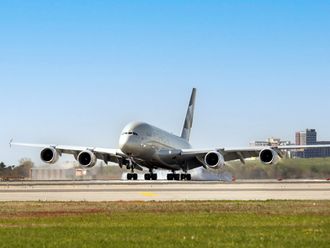Dubai: Boeing Co is wary the Middle East’s growing air traffic congestion could impact its sales in the region if the problem is not solved in the coming decade.
The Middle East is faced with air traffic congestion, particularly over the Gulf, as the three major airlines and their respective hubs, separated by around 45 minutes flying time, rapidly expand.
“Air traffic management certainly has the potential, if you don’t upgrade the system, to have a much larger scale impact on commercial aviation,” said Marty A. Bentrott senior vice president sales at Boeing, in an interview on Wednesday.
Bentrott was speaking on the sidelines of the Arab Air Carriers Organisation Annual General Meet (AACO AGM) held in Dubai this week
The Middle East represents a significant sales market for the United States plane maker. In the Gulf alone, airlines ordered 342 planes from Boeing in the year through September.
Abdul Wahab Tefaha, AACO Secretary General, said Arab governments “are all to blame” for the congestion.
“They have not developed air traffic management in line with their infrastructure and airlines,” he said.
Management system
Middle East governments, notably the UAE, Qatar and Saudi Arabia, have invested billions in expanding airports and airlines.
Industry stakeholders have called for a single regional air traffic management system, similar to Europe’s Eurocontrol, to be implemented in the Gulf and then rolled out to cover other Middle East countries.
Bentrott said Boeing would “positively endorse” such an idea.
Akbar Al Baker, Qatar Airways chief executive, said national regulators are “not strong enough to tell the government what the congestion is doing”.
But political will is so far missing from finding a solution.
Emirates airline President Tim Clark, speaking at a press conference following the AACO AGM, said it is unclear which country an Arabcontrol model would be based.
Bentrott said countries need to invest “more energy, more funding around improving the air traffic management systems”.












